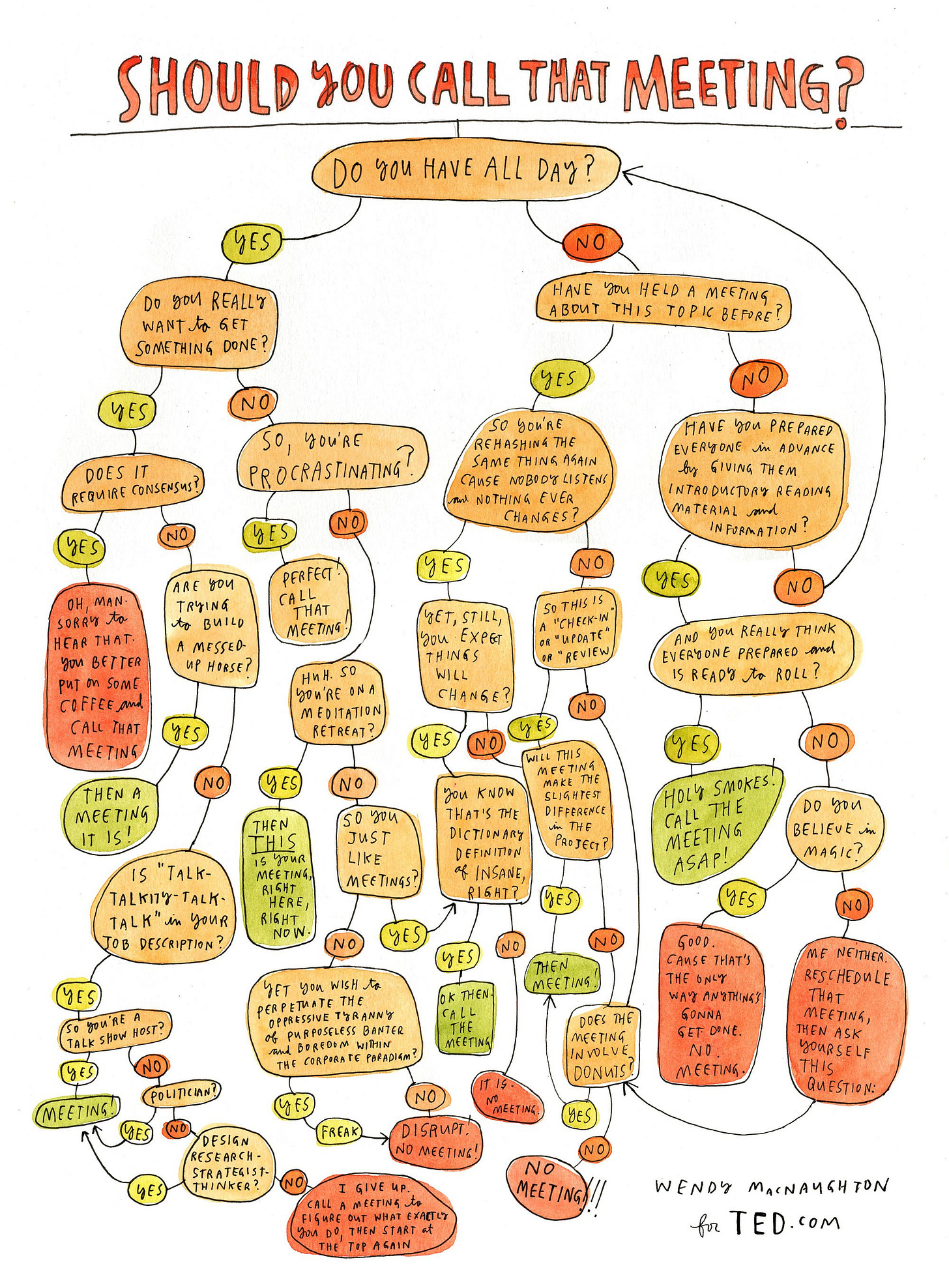Whatever Next #15: Fostering Creative Capabilities To Prepare The Next Generation For The Future
About creativity, learning, effective meetings, social media, self-publishing books, entrepreneurship, and more.
Hi @ll! Welcome to another issue of the newsletter.
This one is the fifteenth issue, the “young and keen” or “la niña bonita” in Spanish. I read about it that when Queen Elizabeth, the second of Spain, turned fifteen, it was considered the “niña bonita”, so the number 15 is named this way. Who knows.
Last week I shared with you my intention to gain time in the morning. And the good news is that I succeeded with it. As Jocko Willink says, Discipline Equals Freedom. I only had to wake up earlier, and now I am doing a morning workout, and I am also meditating.
My next goal is to include some minutes of reading. Remember that leaders are readers, and mornings are a great moment for focus, full attention, and learning retention.
By the way, this week, I realized that I joined MediaMarkt Iberia seven years ago. I would have loved to write a post about it, a retrospective, but I hadn’t enough time. I promise I will.
Today my selection of topics includes creativity, learning, effective meetings, social media, self-publishing books, entrepreneurship, and more.
As I always share with you, please, do not hesitate to add your comments or share your feedback. One of my goals is to learn from you. And if you like it, please share it.
💡 Fostering Creativity in STEM To Prepare Our Next Generation
Researchers found that creativity in science, technology, engineering, and mathematics (also called STEM) is very similar to creativity in the arts. You could see the details in the article Which is more creative, the arts or the sciences?, where you could also find a link to the study.
As it turns out, creativity is general in nature—it is essentially a multifaceted competency that involves similar attitudes, disposition, skills, and knowledge, all transferable from one situation to another.
If this is true, there's a need to teach STEM students differently to develop their creativity. Education systems should assess and foster students' creative capabilities.
The big change for education systems would be moving away from a rather fragmented and haphazard approach to teaching creativity, to a much more holistic and integrated approach. To prepare the next generation for the future, we need to understand the gaps in the market - the human skills that computers, artificial intelligence and automation cannot achieve - and this is where creativity fits.
As read in a Fast Company article, a musician and an engineer will use creativity to solve a problem. Both rely on being open to new ideas, employing divergent thinking, and maintaining a sense of flexibility.
In this situation is when we remember Sir Ken Robinson's words. I included his famous TED Talk Do Schools Kill Creativity? and other links several issues before when I wrote about his passing.
Our education system has mined our minds in the way that we strip-mine the earth: for a particular commodity. And for the future, it won't serve us. We have to rethink the fundamental principles on which we're educating our children.
Before jumping to another topic, I wanted to share a little story from his TED Talk about creativity. I hope you’ll like it.
“I heard a great story recently, I love telling it, of a little girl who was in a drawing lesson, she was 6 and she was at the back, drawing, and the teacher said this little girl hardly paid attention, and in this drawing lesson she did. The teacher was fascinated and she went over to her and she said, “What are you drawing?” and the girl said, “I’m drawing a picture of God.” And the teacher said, “But nobody knows what God looks like.” And the girl said, “They will in a minute.”
🤝 A Guide To Effective Meetings
I saw this infographic thanks to Dr. Tomas Chamorro-Premuzic. Wendy MacNaughton made this great design, and you could find it here.
It is an excellent guide to avoid ineffective meetings. If you use it, maybe you’ll free your colleagues, and they’ll have time for work that really matters.

🙋 The Reward Of Being Dumb
It was Mo Gawdat who shared a podcast interview with Latif Nasser and named the article about The Rewards of Being Dumb. Latif is not dumb at all, is a Harvard Ph.D., but he says that his Ph.D. has given him the license to be the dumbest guy in the room in his Netflix series Connected and ask the questions that are on his mind without fear of people thinking he’s an idiot.
Let’s just be open-minded and listen and think critically and have our own questions. To me, that’s a really important shift, and I think it’s a valuable one. Intellectual humility is a core value for me.
If you want to know more, you could listen to Mo’s podcast (link below) and check out Latif’s on Netflix.


⚔️ The Lights and Shadows of Social Media Fighting Fake News and Misinformation
Since months ago, it is recurrent to find articles and comments regarding Twitter and Facebook's decision on banning content. This increased dramatically as the elections approached.
This week we could find Facebook first and then Twitter, banning and removing content that denied the Holocaust. Probably the most alarming thing is that Facebook cited a recent survey that found that nearly a quarter of American adults ages 18 to 39 said they believed the Holocaust either was a myth or was exaggerated, or they weren't sure whether it happened.
Then Twitter banned NY Post article about Hunter Biden. As Casey Newton stated in his Platformer newsletter, social media platforms have accepted two key responsibilities: to reduce the spread of harmful posts, and to reduce that spread quickly. These actions, especially these days before the elections, aren't free of human errors, misunderstood, or even manipulation.
If you're interested in the topic, I recommend you to read the complete Platformer series, or at least read Casey's follow-up on the subject. And, by the way, Youtube banned Qanon.


Until the end of the elections, and maybe some months after, this will be a constant. Social Media companies will be in the eye of the storm. Social Media has a profound influence on people, and politics are aware of this.
📝 Experiences from a CEO and Co-Founder
This week Ryan Caldbeck, former CEO of CircleUp, shared a Twitter thread and published a medium article including all the details. The thread is incredibly detailed, covering the Why's, the suffering, the worries, fears, and the relief.
He shares deeply and ends the thread asking if this would make people view him as weak, but reminded me again of this quote from Brené Brown: "Vulnerability is not weakness; it's our greatest measure of courage".


Maybe the most discussed part of his post is the feedback that he sent to a board member. I have seen many reactions on Twitter against the board member and him for sharing it. The truth is that they both made mistakes, and they didn't probably face the problem when they should have done it. But this is my humble opinion. On Twitter, you'll find wiser answers than mine.
🤑 Successful Stories From People Self-Publishing Books
We could probably find several success stories of people that self-published books. I have also read different Amazon stories. I found it interesting that first, they are tech people, and second, they wrote about a similar topic: jobs.
They are Randall Kanna and Gergely Orosz. I also included the second in the last issue. They both could be considered successful self-publishers using Gumroad. Randall wrote a medium post explaining the story, which I have below.
Gergely also shared Randall tweet, adding some perspective to this amount of money. He was offered $5000 in advance for his book, and he would have needed 2000 books to arrive at this amount with a 10% royalty. And Randall made $30000 with 1500 books, which means six times that advance.
But books aren’t the only successful case of study for self-publishers. Look at this tweet and article about how a designer created a custom icon pack for iOS and made $100K in a week. Creativity sells, the product is king, and Gumroad is a great place to do it.


🐦 Tweets That Deserve Attention
The first tweet is about a research done with Google employees that surprisingly shows that flexibility gives better results when asking for lasting habits, in this case, doing exercise. Here the interesting point, in my opinion, is to build habits with flexibility against routines.


The second tweet from Julie Zhuo is a guide to help you discover if you’re really frustrated because people don’t consider you, or maybe you should improve yourself.

Last but not least, a wrap up of posts from Ed Batista, sharing experiences talking with leaders "about the impact of the current environment on their organizations, their employees, and their own lives".


That’s it! Thanks for reading. I hope you liked it!
Please, do not hesitate to add any comments. I am open to any suggestions, so if you want to add a comment or contact me, I encourage you to do it.
If you found something interesting, maybe you would like to share it with your colleagues, friends, or family. The more we are, the more we learn from each other.
And if you haven’t subscribed yet, you could do it now. It’s completely free, and you could unsubscribe at any time. You’ll receive as much as an email a week.






thanks for share content